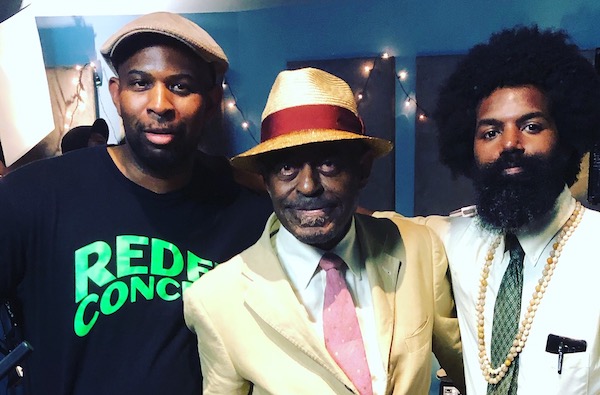Jan 13, 2026 2:09 PM
More Trump-Kennedy Center Cancellations
The fallout from the renaming of the John F. Kennedy Center for the Performing Arts to include President Donald…

Raw Poetic (left), Archie Shepp and Damu The Fudgemunk collaborated on the album Ocean Bridges.
(Photo: Courtesy Redefinition Records)Even when family members share a musical calling, it might take decades for them to collaborate. That was the case for saxophonist Archie Shepp and his nephew Jason Moore, who performs as Raw Poetic. Their jazz-meets-hip-hop release Ocean Bridges (Redefinition) was 20 years in the making, created with input from Moore’s partner, drummer and producer Earl “Damu The Fudgemunk” Davis.
When Moore, a Washington, D.C.-based rapper, launched his career in 2000, he convinced Shepp to play on a track, “Back Into The World Again,” though it never was released. It took two decades to get Shepp back in the studio.
“He made me work for it,” Moore said. “I would send him musical ideas, and he would just say, ‘Oh, you’re not ready yet.’ It really didn’t bother me. I looked at it as if I was just taking notes from one of the greats.”
Shepp, though, hinted that he sees himself as something of a hip-hop forebearer. “I was working with words and poetry all the way back in the 1960s,” he said, citing the landmark LPs Three For A Quarter, One For A Dime (1966) and Attica Blues (1972), as well as his collaborations with Amiri Baraka, James Baldwin and Public Enemy.
“Words have a direct way of communication; music is more nuanced,” Shepp said. “You can interpret [an instrumental] any way that you want. With words added, it makes the songs’ meanings more concrete and specific.”
In 2016, when the NEA paid tribute to Shepp and other recipients of the Jazz Masters fellowship at the Kennedy Center in Washington, Moore and his mother attended the event. Several months later, Moore again approached Shepp about the prospect of collaborating. After hearing some of his then-recent work, Shepp finally agreed. And in 2019, Moore and Davis corralled a crew of five additional musicians for the sessions.
By then, the MC had gained new insight into collaborating with jazz-inclined musicians. “It’s one thing to rap over beats and it’s another thing to blend it with a certain type of melody that a jazz artist would play,” he said. “It’s about learning to breathe and using my voice like a saxophone. It felt like I was trading solos with Archie.”
Among Ocean Bridges’ highlights is “Learning To Breathe,” a percolating joint where Moore combines battle-rhymes with themes about living while Black in America.
For the sessions, Davis said that the band would warm up and start grooving while the tape rolled. Shepp would be in another room, and once the music had locked into a vamp, he’d enter the studio and find his way into the music.
Lyrics came after Moore listened to the recorded sessions: “I took it home and started breaking things apart. I had to think about where I fit inside the music. The instruments sort of told the story before my voice did.”
In between fleshed-out tracks, such as the searing “Searching Souls,” are seven interstitial pieces, each titled “Professor Shepp’s Agenda,” on which the saxophonist waxes about topics like the loss of oral histories in the Black diaspora and the value of education.
“The musicians sounded like they were trying to break some new ground, especially with the rapping,” Shepp said. “I was impressed by their enthusiasm and the novelty of their invention, particularly the spoken word. Poetry today is frequently bound up with the music. So, the message is not always so clear.”
Moore saw the project as an endeavor that ultimately boosted his skills. “The things I’ve learned the most from working with Archie is that you never stop learning, and that you should never stop experimenting. I discovered new sounds just exploring my vocal range because the music called for it. I’ve learned how to dig deeper.” DB
This story originally was published in the August 2020 issue of DownBeat. Subscribe here.

Belá Fleck during an interview with Fredrika Whitfield on CNN.
Jan 13, 2026 2:09 PM
The fallout from the renaming of the John F. Kennedy Center for the Performing Arts to include President Donald…

Peplowski first came to prominence in legacy swing bands, including the final iteration of the Benny Goodman Orchestra, before beginning a solo career in the late 1980s.
Feb 3, 2026 12:10 AM
Ken Peplowski, a clarinetist and tenor saxophonist who straddled the worlds of traditional and modern jazz, died Feb. 2…

The success of Oregon’s first album, 1971’s Music Of Another Present Era, allowed Towner to establish a solo career.
Jan 19, 2026 5:02 PM
Ralph Towner, a guitarist and composer who blended multiple genres, including jazz — and throughout them all remained…

Rico’s Anti-Microbial Instrument Swab
Jan 19, 2026 2:48 PM
With this year’s NAMM Show right around the corner, we can look forward to plenty of new and innovative instruments…

Richie Beirach was particularly renowned for his approach to chromatic harmony, which he used to improvise reharmonizations of originals and standards.
Jan 27, 2026 11:19 AM
Richie Beirach, a pianist and composer who channeled a knowledge of modern classical music into his jazz practice,…